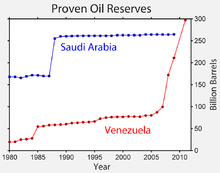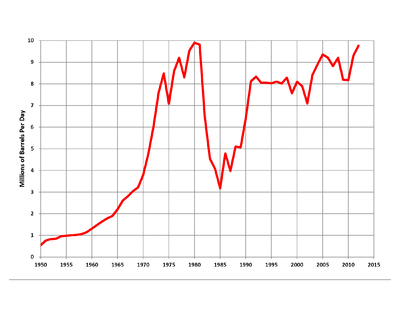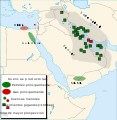Oil reserves in Saudi Arabia

The proven oil reserves in Saudi Arabia are the second largest in the world, estimated to be 268 billion barrels (43×109 m3) (Gbbl hereafter), including 2.5 Gbbl in the Saudi–Kuwaiti neutral zone. They are predominantly found in the Eastern Province.[1] These reserves were the largest in the world until Venezuela announced they had increased their proven reserves to 297 Gbbl in January 2011.[2] The Saudi reserves are about one-fifth of the world's total conventional oil reserves, a large fraction of these reserves comes from a small number of very large oil fields, and past production amounts to 40% of the stated reserves.
In 2000, the US Geological Survey estimated that remaining undiscovered oil reserves in Saudi Arabia had a probability-weighted average of 90 Gbbl.[3]
Major oil fields
Although Saudi Arabia has around 100 major oil and gas fields, over half of its oil reserves are contained in only eight giant oil fields, including the Ghawar Field, the biggest oil field in the world with an estimated 70 billion barrels of remaining reserves. 90% of Saudi Arabia's oil production comes from five fields and up to 60% of its production comes from the Ghawar field.[4]
Production

Saudi Arabia has traditionally been regarded as the world’s most important swing producer of oil. When acting as such, the Saudi government would increase or decrease oil production to maintain a more stable price.[5]
Saudi Arabia produced 10.3 million barrels per day (1.6×106 m3/d) (Mbbl/d) in 1980, 10.6 Mbbl/d in 2006,[6] and in the region of 9.2 Mbbl/d in 2008.[7] Saudi Arabia maintains the world’s largest crude oil production capacity, estimated to be approx. 11 Mbbl/d at mid-year 2008 and announced plans to increase this capacity to 12.5 Mbbl/d by 2009[8] Cumulative production through the end of 2009 was 119.4 billion bbl.[9] Using the stated number of 267 Gbbl, past production amounts to 40% of the stated remaining proved reserves.
After the then U.S. president George W. Bush asked the Saudis to raise production on a visit to Saudi Arabia in January 2008 and they declined, Bush questioned whether they had the ability to raise production any more.[10] In the summer of 2008, Saudi Arabia announced an increase in planned production of 500,000 barrels per day.[11] However, in 2008, some experts believed that Saudi oil production had already peaked or would do so in the near future.[12] In April 2015, the Saudi oil minister Ali Al-Naimi said that Saudi Arabia produced 10.3 million barrels per day in March that year, which was the highest figure based on records since the early 1980s. The previous peak was in August 2013 at 10.2 million barrels per day.[13]
Data quality
Since 1982, the Saudis have withheld their well data and any detailed data on their reserves, giving outside experts no way to verify Saudi claims regarding the overall size of their reserves and output. This has caused some to question the current state of their oil fields. In a 2004 study, Matthew Simmons analyzed 200 technical papers on Saudi reserves by the Society of Petroleum Engineers and concluded that Saudi Arabia's oil production faced near term decline, and that it would not be able to consistently produce more than 2004 levels, when production of crude oil and lease condensate averaged 9.10 million barrels per day. Simmons also argued that the Saudis may have irretrievably damaged their large oil fields by over-pumping salt water into the fields in an effort to maintain the fields' pressure and boost short-term oil extraction. He concluded (in 2004): "In 2-3 years we will have conclusive evidence that Saudi oil is peaking,"[4] Since his prediction, Saudi crude oil production has varied from as low as 8.25 million barrels per day (average for 2009) up to 9.83 million barrels per day (average for 2012). Overall, in the nine years since his 2004 prediction (2005-2013), Saudi crude oil and lease condensate production has averaged 9.20 million barrels per day, just slightly higher than 2004 levels.[14]
Diplomatic cables leaked during the United States diplomatic cables leak in 2011 revealed that Sadad al Husseini, former vice president of Saudi Arabia's oil monopoly Saudi Aramco, warned the US that the oil reserves in Saudi Arabia might in fact be 40% (300 billion barrels) lower than claimed.[15][16]
Gallery
-

Oil and gas field locations
-

Saudi Arabia production, consumption, and exports over time
-

World oil reserves before the increase from Venezuela
See also
References
- ↑ Learsy, Raymond (2011). Oil and Finance: The Epic Corruption. p. 89.
- ↑ Venezuela: Oil reserves surpasses Saudi Arabia's at english.ahram.org.eg
- ↑ US Geological Survey, Saudi Arabia, 2000.
- 1 2 "New study raises doubts about Saudi oil reserves". Institute for the Analysis of Global Security. 2004-03-31. Retrieved 2008-07-30.
- ↑ Daniel Yergin, “Who will rule the oil market,” New York Times, 23 Jan. 2015.
- ↑ Farsalas, Ken (2008-07-29). "No Speculation On Oil Reality". Forbes.com. Retrieved 2008-07-30.
- ↑ "Petroleum (Oil) Production". International Petroleum Monthly (U.S. Energy Information Administration). April 2008. Retrieved 2008-05-14.
- ↑ "Saudi Arabia Oil Statistics". Country Analysis Briefs. US Energy Intelligence Administration. August 2008. Retrieved 2008-08-15.
- ↑ "Daily and Cumulative Crude Oil Production in OPEC Members". OPEC Annual Statistical Bulletin (OPEC). 2009. Retrieved 2009-02-22.
- ↑ Tverberg, Gail (2008-01-18). "President Bush Questions Saudi Ability to Raise Oil Supply". PRWeb. Retrieved 2008-02-01.
- ↑ Penketh, Anne (2008-06-16). "Saudi King: 'We will pump more oil'". The Independent. Retrieved 2008-07-24.
- ↑ http://www.forbes.com/2008/07/29/carrizo-willbros-dawson-pf-ii-in_kf_0729soapbox_inl.html
- ↑ "Saudi pumps up oil production to record high 10.3 million bpd". Reuters. 8 April 2015.
- ↑ US EIA, Crude Oil + Lease Condensate, International Energy Statistics, Petroleum Production.
- ↑ John Vidal (9 February 2011). "WikiLeaks cables: Saudi Arabia cannot pump enough oil to keep a lid on prices". The Guardian. Retrieved 9 February 2011.
- ↑ "Saudi oil reserves 'overstated'". Al Jazeera. 9 February 2011. Retrieved 9 February 2011.
External links
| ||||||||||||
| |||||||||||||||||||||||||||||||||||||||||||||||||||||||
